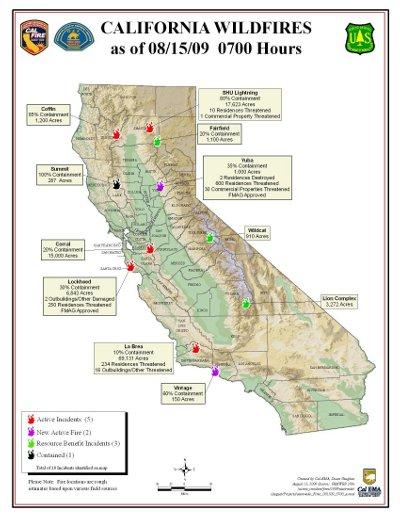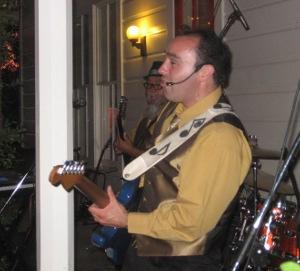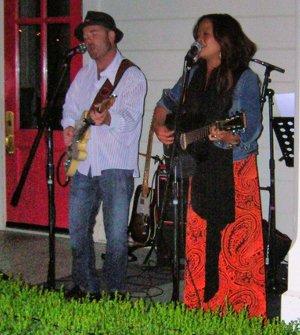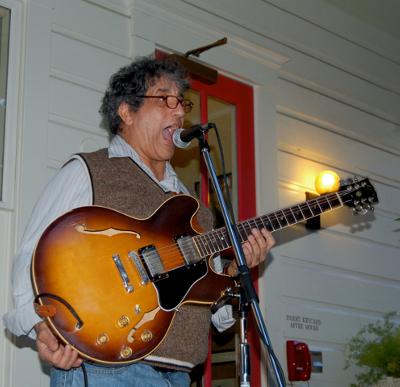LAKEPORT – On Friday the district attorney presented several rebuttal witnesses in an effort to impeach defense testimony that suggested a Carmichael man wasn't responsible for a fatal 2006 boat crash.
However, Judge J. Michael Byrne ruled Friday that one witness District Attorney Jon Hopkins wanted to bring to the stand with a new evidence report wouldn't be allowed, saying the information should have been prepared and presented earlier in the more than three year old case.
Hopkins is seeking to convict 41-year-old Bismarck Dinius of felony boating under the influence with great bodily injury in connection with the death of 51-year-old Lynn Thornton of Willows.
On the night of April 29, 2006, Dinius was at the tiller of the Beats Workin' II, a sailboat that was hit by a powerboat driven by an off-duty sheriff's chief deputy, Russell Perdock, who wasn't charged in the case, but who the defense argues was driving too fast for conditions.
Although Thornton's boyfriend, Mark Weber, owned the sailboat Dinius was steering, Hopkins is arguing that it was Dinius who ultimately was responsible for the crash because he is alleged to have had a blood alcohol of 0.12 and was under way without lights.
Defense attorney Victor Haltom also signaled Friday that he will once again file a motion for acquittal based on his assertion that Dinius did not have a duty to turn on the boat's navigation lights.
On Thursday Haltom rested his case, which set the stage for Hopkins to present his rebuttal witnesses.
Before the jury was brought in for the morning sessions, Haltom argued against allowing three witnesses Hopkins planned to call – Denise Rockenstein, a reporter for the Clear lake Observer American and Lake County Record-Bee, District Attorney's Office Investigator Craig Woodworth and sheriff's Deputy John Gregore.
Regarding Rockenstein, Haltom said she was being presented to impeach John Jansen, who testified earlier in the week to having seen Perdock at Konocti Harbor Resort & Spa's outside bar before racing him across the lake in the hours before the crash.
He wanted a special hearing on admitting her testimony, which he said consisted of saying she was at a restaurant and bar in Clearlake where Jansen's friends, Luke Glanzer and another subject identified only as “Big Worm,” were talking about “racing all day” with Perdock on the lake. Jansen reportedly said nothing during the conversation.
Haltom said the testimony would be inconsistent since Perdock was said to have been on a Scout hike with his son earlier in the day.
Hopkins replied, “This is offered to show not the truth of the statements of these two men but the fact that they are making those statements and he is sitting there not saying anything, not joining in, not correcting them.” He said it showed Jansen's state of mind and showed the lack of credibility in his statements.
“It has some relevance,” said Byrne. “The jury can weigh it.”
When Haltom tried to argue, Byrne said, “It's not his statement, it's his conduct,” that was at issue.
Haltom questioned if Jansen even heard what the two were saying. That was a foundational issue, said Byrne. Haltom said he didn't believe the foundation existed, and said Jansen denied having that conversation. In that case, Hopkins said, it comes in as an inconsistency that further impeaches him.
While Byrne allowed Rockenstein to testify, he denied allowing Woodworth, who the prosecution had called during the main portion of the case, and whose planned testimony had potentially more significant implications.
On Wednesday, Hopkins had Woodworth, his acting chief investigator, go to the sheriff's Boat Patrol facility on Buckingham Point to examine the sailboat's wiring. Woodworth then compiled a six-page report with 70 photos in an effort to impeach the testimony presented last Friday by defense expert Dr. William Chilcott, a forensics engineer.
“Either we're not very smart or the report is poorly written, because we can't figure out what it says,” said Haltom.
The report said that the wires to the sailboat's stern light were not severed during the collision, as Chilcott testified, Haltom said.
“This is evidence that needs to have been presented in the case in chief,” said Haltom, who told Byrne that the report containing Chilcott's conclusions was submitted to the District Attorney's Office in January 2008.
Chilcott, who was not made subject to recall, has since returned to Idaho, and doesn't currently have fax or Internet capability, said Haltom, who quoted case law that argued against late presentation of such evidence.
The evidence was completely improper, said Haltom, who explained the trial was going to have to be delayed until he could get the information to Chilcott for a response.
“It's insane for the prosecution to have waited until Aug. 12 to go do this examination,” Haltom said.
Hopkins said the information was important. Chilcott did not come to his conclusions through scientific testing, such as tracing the wires to make sure they went to the stern light, but only based the statements on a visual inspection.
Woodworth's findings contradicted Chilcott's, Hopkins said, and the wires looked nothing like how Chilcott identified them in photographs on the stand. He said Woodworth should be allowed to testify that Chilcott's conclusions are not supported by facts.
The report showed that Weber was correct when he said the sailboat's mast light wasn't working, said Hopkins.
“There is not the kind of severing that he says took place,” Hopkins said of Chilcott. “This is the key to their expert testimony, and it's faulty.”
Hopkins said that wire was going to be brought to court, along with photos tracing where it went, which Chilcott failed to do.
A frustrated Haltom got up from his seat and stood behind the defense table as Hopkins stated that the report wasn't purposefully held back.
“It is relevant, there's no question about it,” Byrne said of the wire study.
However, he said that issue has been central since the case's beginning. “We're now talking about three years later,” said Byrne, adding that the study should have been done well this week, and so raised a foundational problem.
The testimony – which Byrne said should lead to undue consumption of time – should have been outlined and prepared as part of Hopkins' case in chief.
He ended by sustaining Haltom's objection and denying the admission of Woodworth's testimony.
Hopkins continued to argue on behalf of producing Woodworth and his report, at which point Byrne held up his hand and said, “Counsel, I've ruled.”
Haltom also objected to Hopkins presenting Gregore, who he said was being used to impeach the testimony of Henry “Ed” Dominguez, a sailboat passenger who testified earlier in the trial.
In a videotaped statement Dominguez gave to Gregore at the scene, he had said Weber and Dinius were “hammered,” said Hopkins. On the stand this week Dominguez said “hammered up” mean happy.
Haltom said Dominguez had been released and not subject to recall. Hopkins said he didn't plan to ask him to explain. The judge said there was some relevance to the questioning.
Before the jury came in, Hopkins – noting the judge already had ruled – said he wanted to introduce Woodworth's photos because they impeach Chilcott's ability to identify facts from a photo. Hopkins said Chilcott had identified characteristics in light bulb filaments that the report could contradict. The judge let his ruling stand and called for the jury to be brought in.
Sheriff's sergeant explains computer system
Hopkins' first witness was Sgt. Dave Garzoli, a Lake County Sheriff's Office employee of nearly 20 years. Garzoli testified about the agency's RIMS software system, used for making and tracking reports and investigations. He's been the department's assistant RIMS administrator for five years.
Garzoli said Boat Patrol Supervisor Sgt. Dennis Ostini asked him this week if he could run a search of the system to determine if any deputy had contacted Jean Strak, who testified Wednesday that she saw the sailboat's lights on as it pulled out of a boat slip at Richmond Park Bar & Grill for its nighttime cruise.
Strak stated that a deputy came to her tanning salon on Soda Bay Road within a week of the crash and interviewed her for an hour, but Haltom said he never received any report from the sheriff's office about her statement.
Garzoli said he found a contact for Strak in the RIMS system; it wasn't for the boat crash but, rather, for a bar fight that same year. On Thursday Garzoli ran several advanced searches and found no indication that a sheriff's deputy contacted her at the tanning salon, but that she had been interviewed at the bar where she was assaulted.
Showing Garzoli the RIMS audit log for the case, Haltom asked if a contact a deputy made with Strak would show up in that documents. No, said Garzoli. He explained that if there was a contact with Strak it would only have showed up if a report was written or other information was added to the case file.
Asking Garzoli to turn to a specific report page, Haltom asked him about a set of initials.
“Who is REP?” Haltom asked.
“Russell Perdock,” said Garzoli.
Hopkins objected, saying the question was beyond the scope, which Byrne sustained.
Haltom asked if the audit log showed alterations to the report. Hopkins again objected and Byrne sustained.
Could a sheriff's deputy have changed the report had Strak been contacted? Haltom asked. Yes, certain deputies could, Garzoli said.
“Is Russell Perdock one of those deputies?” Haltom asked. Garzoli said yes.
How many times do the initials “REP” appear in the audit report? Haltom asked. Hopkins objected and Byrne again sustained.
To enter a report into the RIMS system, does a deputy need to be on a computer at the sheriff's office? Haltom asked.
“There's a handful of people that have remote access from their homes,” said Garzoli, adding that most of the reports would be made at the sheriff's office.
Haltom said he wanted Garzoli to be subject to recall.
Hopkins asked Garzoli if a deputy's case report or a call in to dispatch to record a contact can be erased out of the system once it's entered. Garzoli said. no.
Deputy discusses statements from witnesses, his own concerns
Gregore, a seven-year sheriff's office veteran who is assigned to patrol, responded to the Konocti Bay area after the crash was reported. “It was a pretty chaotic scene.”
He said then-Sgt. James Beland had him contact all the witnesses at the scene and do recorded interviews, which he did using the mobile audio visual unit in Beland's patrol car.
Gregore said he spoke with Peter Erickson and four other subjects who accompanied Erickson out on his boat to the crash scene. They didn't witness the crash, so Gregore took their contact information for a later interview.
Hopkins asked him about speaking to fishermen Colin Johnson and Anthony Esposti. Haltom objected and Byrne sustained, but Hopkins said, “It's very brief.”
Byrne asked Hopkins and Haltom to approach the bench and after a brief discussion Byrne said he would allow questions about course of conduct.
Gregore recorded the statements of Dominguez and his fiancee, Zina Dotti. He said Dominguez described both Dinius and Weber as “hammered,” before adding, “Well, maybe not hammered but they'd definitely been drinking.”
He said he didn't contract Strak about the crash. Gregore said he didn't go to Konocti Harbor that night. He did see Perdock at the crash scene but didn't go up to him or hear him say anything about having a soda at Konocti Harbor.
Haltom asked Gregore if Dotti told him anything about the speed at which Perdock's boat had been traveling. Hopkins objected and Byrne sustained. Haltom asked if he had put anything in his report about Dotti's comments on Perdock's speed. Hopkins objected and Byrne overruled. No, said Gregore, his report didn't mention the speed statements.
What did Dotti tell him about the boat's speed? Haltom asked. Hopkins objected and Byrne again overruled. Gregore said Dotti stated that Perdock was going very fast.
Dominguez told Gregore he wasn't sure about lights on the sailboat. “He didn't remember clearly seeing any lights,” Gregore said.
“Did you have any thoughts about the fact that Mr. Perdock was involved?” Hopkins asked.
“I did,” said Gregore before Haltom objected, but Byrne overruled.
“I didn't want to be there. I didn't want to be involved with it,” said Gregore. However, he added, “You can't put everything on hold at the scene.”
He said he wanted to get accurate interviews that reflected peoples' true accounts of what happened.
Did he try to protect Perdock? Hopkins asked.
“Absolutely not,” said Gregore.
Gregore, who came from an area where the nighttime water speed limits was 5 miles per hour, thought that was the legal speed in all cases, so originally Gregore said he thought Perdock had broken the speed law.
Hopkins asked Gregore if he noted signs of Weber's intoxication in his report. Haltom objected and Byrne overruled.
Gregore said yes, noting that he saw Weber had red, watery eyes, slurred speech and there was the odor of alcohol on him.
Reporter recounts conversation with Jansen, friends
Next to take the stand was Rockenstein, who said she knew Jansen as “Yoshi.” She encountered Jansen, Glanzer and “Big Worm” – she knew only that his first name was Robbie – at the Lakehouse Inn in Clearlake.
She said she was standing near the men in the smoking area on the back deck, overlooking the water. “They were talking about having raced on Clear Lake, having raced Russell Perdock,” she said.
Rockenstein said Glanzer and Big Worm were doing most of the talking, saying on the day of the crash they had been on the lake racing Perdock all day. Jansen “wasn't offering much but he was standing right there,” she said.
“I basically told them that wasn't true,” said Rockenstein.
Perdock, she said, “could be accounted for all day.”
Haltom objected to the statement, but Byrne overruled him.
When his turn came to question Rockenstein, the only question Haltom asked was, “Are you a reporter for the Lake County Record-Bee?” She said yes.
Ostini recalled to stand
Ostini, who testified two different times during the trial, was Hopkins' last witness on Friday.
He recounted Chilcott coming to look at the instrument panel on Perdock's powerboat. Ostini said he, Deputy District Attorney John Langan and Haltom were present when Chilcott checked for “needle slap” – the mark of a needle on a glass gauge face as the result of an abrupt deceleration such as occurs during a crash.
Ostini said both he and Chilcott climbed into the boat, and pulled a thick black plastic cover over them so Chilcott could use a black light to look at the gauges. Chilcott told Ostini that the needles weren't the type to show needle slap under black light, so he used a flashlight.
Pointing to a speck of dust on the gauge face, Chilcott said it was evidence of needle slap, according to Ostini. Ostini said he told Chilcott he was mistaken, and recalled asking Langan and Haltom for permission to clean the glass, which he said they gave. The dust came off.
He said he didn't speak with Peter Erickson at the scene; Ostini said the only witnesses he was talking to at the time where those who saw the crash itself. He also was trying to get the boats transferred to the sheriff's facility and get to the hospital to see Weber and Dinius before they were discharged.
Ostini said he hadn't heard about Strak until a couple of years into the investigation. He said she was contacted May 6, 2006, at Richmond Park regarding a bar fight in which she was assaulted. A deputy contacted her again about that fight on May 30, 2006, but there was no indication she had ever been visited at her salon.
Hopkins asked Ostini if he heard Perdock say anything about a soda. Haltom objected and Byrne sustained.
“Your honor, that was testimony on the defense case by Mr. Peter Erickson,” Hopkins said.
“All right, I'll allow it,” said Byrne.
Ostini said he didn't hear Perdock say that.
Haltom asked Ostini if he was at Perdock's side constantly at the scene. Ostini said no.
Going back to Ostini's recollection of the needle slap test, Haltom asked if Ostini remembered him being there. Ostini replied, “I'm sorry, you are correct,” about Haltom not being there.
Did Perdock order someone to contact Strak? No, Ostini said, adding he hadn't discussed the situation with Perdock.
Hopkins showed Ostini a portion of the audit report and pointed out Gregore's initials, to which Haltom objected and Byrne overruled. “It'll become clear,” said Hopkins.
He read off a list of witnesses and the names of those involved that Gregore had entered into the RIMS system between midnight and 1 a.m. on Sunday, April 30, 2006.
“The electronic report is rather fluid, and you can keep adding to it,” said Ostini
Haltom asked if Ostini had seen entries for locking the report. “The report is locked by a supervisor when it's completed,” Ostini said. Had he seen it unlocked? Ostini said he hadn't recently reviewed it.
Another witness Hopkins wanted to call couldn't make it on Friday, so Byrne dismissed the jurors for the day, telling them they may hear two more witnesses on Tuesday when court reconvenes at 10 a.m. A hearing on the release of Perdock's personnel records is scheduled at 8:30 a.m.
Following those final witnesses, which will be on the stand a short time to clarify a few matters, Byrne said they'll go into arguments and jury instructions. “We are way ahead of schedule.”
On Monday Byrne, Hopkins and Haltom will meet to go over jury instructions. Byrne said he's assessing whether to do arguments or instructions first. If all goes well, he said, the jury should have the case Tuesday or Wednesday.
The attorneys are “going to have a lot to say” during closing arguments, so Byrne urged jurors not to make up their minds before closing arguments.
Defense to press for acquittal
With the jury gone, Haltom notified the court that at the end of closing arguments he'll seek a judgment for acquittal.
Haltom said he'll pinpoint the issue of duty – specifically, if it was Dinius' duty to turn on the sailboat's navigation lights.
“Determining the existence of duty is for the court, not the jury,” Haltom said.
If there's no duty, the case can't go to the jury, said Haltom. “Our position is he had no duty to turn on the lights.”
Byrne noted that there are a lot of recent cases on duty in civil matters.
E-mail Elizabeth Larson at This email address is being protected from spambots. You need JavaScript enabled to view it. .












